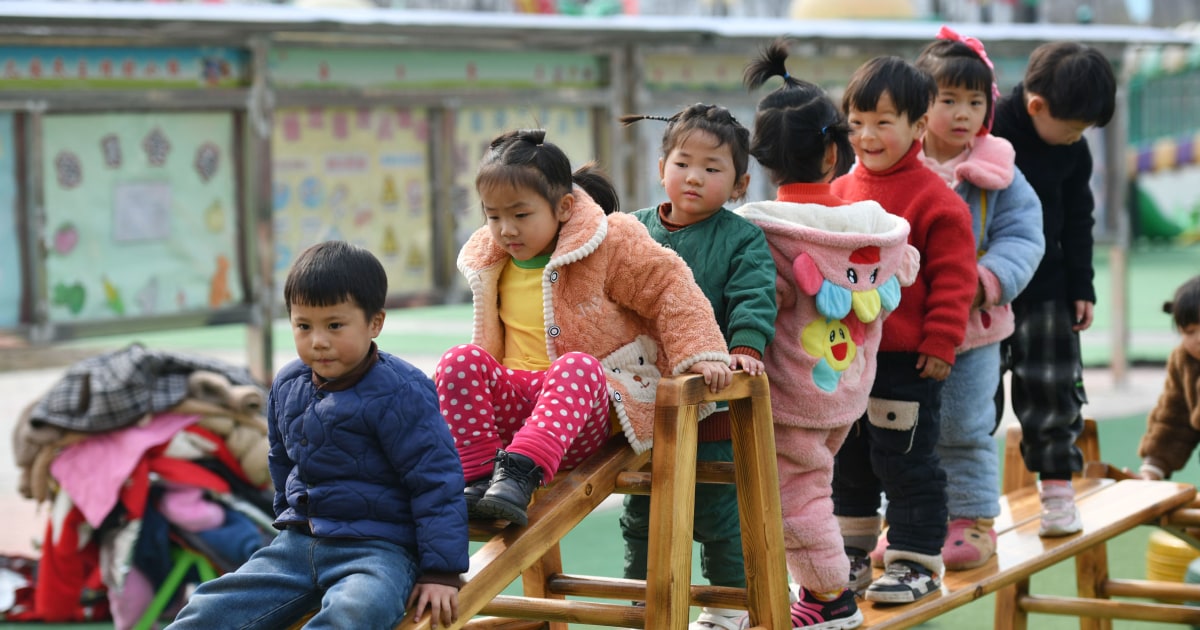The number of births in China tumbled 10% last year to hit their lowest level on record, a drop that comes despite a slew of government efforts to support parents and amid increasing alarm that the country has become demographically imbalanced.
China had just 9.56 million births in 2022, according to a report published by the National Health Commission. It was the lowest figure since records began in 1949.
The high costs of child care and education, growing unemployment and job insecurity as well as gender discrimination have all helped to deter many young couples from having more than one child or even having children at all.
Its funny cuz the kids in the pic are on a “slide.”
This is a good thing. Almost all countries need to reduce their population. We just have way too many people on the planet and it’s stressing the system.
I think the problem is not overpopulation but inefficiency with the system
You’re dangerously wrong
https://www.theworldmind.org/home/2021/12/10/the-dangerous-myth-of-overpopulation
https://theecologist.org/2020/apr/16/debunking-overpopulation
https://www.vox.com/energy-and-environment/2017/9/26/16356524/the-population-question
https://socialist.net/capitalism-and-food-hunger-amidst-plenty
Thanks for the links. Interesting reads.
Tldr, oxfam:
Around 50% of these emissions meanwhile can be attributed to the richest 10% of people around the world, who have average carbon footprints 11 times as high as the poorest half of the population.
Hard to swallow pill: The way of life of the rich countries, including the one of their poor citizens, is the problem. We, the westerners, are the problem, not the billions of China and India.
But yay electric cars and recycling… Insert “I’m doing my part” meme.
This also ignores the growing middle class in China and India. Countries will have to be quality of life competitive or they will experience brain drain to the west.
This isn’t necessarily about the sheer size of population, and has more to do with birth rates, but this Kurzgesagt video also outlines well the need for a higher birth rate.
deleted by creator
Almost all countries need to reduce their population.
On the contrary, actually, we need to increase our populations. Assuming that you mean an equal reduction in all demographics, the existence of productive, and hyper-productive people is mostly a game of statistics. A larger population means that more of such people will exist. Such individuals are necessary for pushing humanity forward. A nation with a larger population means a larger natural defence. A larger gloabal population decreases the chances of a mass-extinction event.
it’s stressing the system.
What specific stresses are you referring to? We have no lacking in resources, nor space. Economic activity is proportional to those acting within it.
So I was thinking this same thing until I watched a Kurz Gesagt video on YouTube about the effects of unbalanced populations. They pointed out that by the time our population naturally starts decreasing we’ll already be dealing with the worst consequences made worse by an aging population that cares more about maintaining the status quo than the innovation that a younger population would encourage. Grain of salt obviously… But now I’m trying to rethink how I see the issue of maintaining stability for ourselves and descendants while decreasing our strain on the system.
I don’t know where I was going with this.
That’s OK, just don’t mind in working until our deaths since society won’t be able to afford any retirement system, unless for the ultra rich
Are you saying that offspring are most valued as an early retirement?
No, I’m just saying people have to work and if just a small proportion of the population is at work age, then that work age range will inevitable increase. Or do you think just 10%-20% of people working will be be able to support and supply the remaining 80% - 90%?
We can also solve this by throwing old people(when people who today are 20-40 get old probably)to the pit like that dinosaur show from the 90s ;)
The system could support more people, but the world leaders are stupid, greedy, and short-sighted so currently it is a bad idea to have more people.
It’s rather less young people than pensioners…
Not from China but it would have such a massive negative impact on our standard of living that it’s just not worth it. It’s not that we don’t want kids, but we like not being in debt more.
Poverty has never been a major cause of low births. The poorest countries in the world have the highest birth rates. Instead it’s about increasing women’s health and education, giving them the choice to have fewer children or none. Turns out when they have the choice women don’t want to get pregnant and raise kids at 20. They want to have careers and lives and travel and stuff.
Nations need to make child rearing more appealing for couples to want to be parents. Because a huge chunk of people could have salary raises and homes and be upper class and still now want to have kids.
No, it’s 100% economics. Why do you think that having “careers, lives and travel” (as if having a family is not having a life?) is more appealing to modern first worlders? Because it doesn’t impact their finances severely. Having more children in impoverished countries is a financial gain because children are free labor and lottery tickets to get the entire family out of poverty. In wealthy countries, children are only a financial loss.
It’s good news
We were taught about demographic imbalance years ago and how it would be incoming and yet nothing was done.
This is good, in my opinion.
Pollution, overpopulation, health crises, housing crises, food crises, political instability, war, the list goes on for why people aren’t having kids.
The real reason for most of the above boils down to one thing: greed.
A single income family used to be able to support multitude of children without issue. Now a dual income family has to consider finances when considering a single child. All because of the world they’d be bringing it into that has been destroyed by greed.
Contraction of economies is going to hurt all of us, but it’ll hurt the ones at the top the most, because there is only so much they can take until there aren’t enough humans to take from anymore, and the power/wealth gap will have to close out a different system will have to be established.
Hahaha! Humans humaned themselves out of humanity
This is the best summary I could come up with:
BEIJING — The number of births in China tumbled 10% last year to hit their lowest level on record, a drop that comes despite a slew of government efforts to support parents and amid increasing alarm that the country has become demographically imbalanced.
China had just 9.56 million births in 2022, according to a report published by the National Health Commission.
Last year, the country’s population also fell for the first time in six decades, dropping to 1.41 billion people.
That has caused domestic demographers to lament that China will get old before it gets rich, slowing the economy as revenues drop and government debt increases due to soaring health and welfare costs.
Nearly 40% of Chinese newborns last year were the second child of a married couple, while 15% were from families with three or more children, health authorities said.
To spur the country’s flagging birth rate, Beijing has been rolling out a raft of measures, such as efforts to increase child care as well as financial incentives, and President Xi Jinping in May presided over a meeting to study the topic.
The original article contains 256 words, the summary contains 181 words. Saved 29%. I’m a bot and I’m open source!











